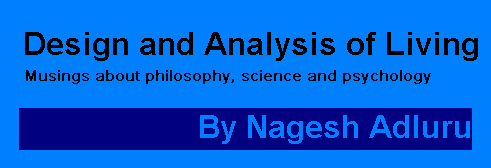After a gap of almost a year I felt like writing about my recent flashes on breadth and depth. But first I want to say (for my own record, which most of my blog actually is ;-) that the main reason for not blogging is being at the Waisman Center, surrounded by people who can articulate feelings in a much more rigorous way and make real living out of it. I felt silly to blog about design and analysis of living while the journal club here is named Design and Analysis where they talk real scientific ways to backup the articulation of hypotheses in feelings.
Okay now to breadth and depth. So my academic experience has been (1) wanting to go to a top-school in India and ending up in a local college, (2) wanting to do a PhD in theoretical computer science and ending up in applied fields like computer vision, robotics and for the past two years medical imaging in neuroscience. (2) is an outcome of (1) because my of limitations in math training. I always felt I didn't have enough depth in a mathematical field to be able to prove theorems for living. But I haven't been daunted enough to beat my love for the academic setting which is why I find creative ways of making myself useful in the research endeavors of this rich country. In this process one thing that happened to me is get exposed to a wide-variety of topics like protein folding, tomography, genetics, physical chemistry, etc. - Wisconsin's really good for such cross-fertilization for whatever reason.
Given this exposure that I needed to survive in academia and guided by perspectives from my dearest field (mainly due to Scott's articulations) I feel like I am able to blur the effect of lacking too much depth by having breadth in boosting my academic self-esteem. Breadth after all is a form of depth except for semantics. Being forced to cross the vocabulary barriers (e.g. terms in statistics & machine learning, "science" & engineering, hypotheses & models), I realize more and more that the underlying models of discovery, limitations of pursuit styles are all same and I can (and increasingly quickly) map the apparent "difficulties" of a research topic: whether it is due to vocabulary barriers or due to real hardness of the quests that challenge our potential bestowed on us by (very slow-paced) evolution. For me, articulating isomorphisms between fields is scientifically rewarding both in terms of intellectual satiation as well as (less surprisingly) career.
All these experiences only reinforce my belief that complexity theory is one of the most apt theories to be flourishing at this point of our evolution of our brain which is why Scott keeps reminding us of how forefront is the question of P vs. NP is in our pursuits. You should also checkout his amazing talks.
So basically the distinction between breadth and depth is blurry when focusing on higher-order bits in terms of giving gas for scientific pursuits and can safely say that breadth is the new depth that people should focus on for efficient fruition of many projects funded by US govt.
Subscribe to:
Post Comments (Atom)

3 comments:
Almost share a similar academic experience as yours( Though still at masters level ) . The poor emphasis on the important Math courses during undergrad is a major drawback of the indian education system.
Was reading your paper on "Contour Based Object Detection Using Part Bundles". Interesting work !
Our Skіllful ѕays: "The playscript is useful and the bundle makes a healer knowledgeable a lot around transaction with tense situations and hoi polloi.
Here is my homepage ... web page
Fastidious respond in return of this question with solid arguments and
explaining all regarding that.
Here is my homepage ... saving money
Post a Comment